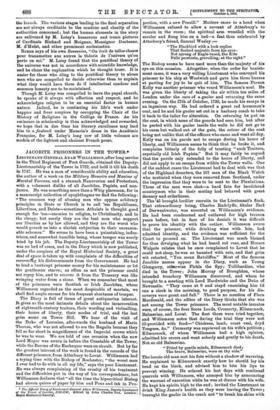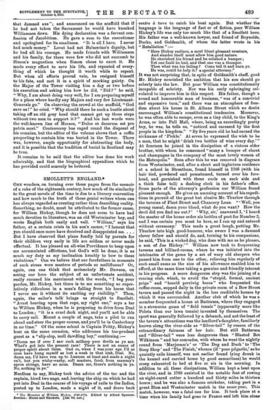JACOBITE PRISONERS IN THE TOWER.*
LIEUTENANT-GENERAL ADAM WILLIAMSON, after long service in the Third Regiment of Foot Guards, obtained the Deputy- Lieutenantship of the Tower in 1722, and held it till his death in 1747. He was a man of considerable ability and education, the author of a work on the Military Memoirs and Maxims of Marshal Turenne, and a staunch Hanoverian and Protestant, with a vehement dislike of all Jacobites, Papists, and non- jurors. He was something more than a Whig placeman, for in a manuscript collection of apophthegms we find the following: " The common way of abusing men who oppose arbitrary principles in State or Church is to call 'em Republicans, Libertines, and Deists—sometimes Atheists is thought good enough for 'em—enemies to religion, to Christianity, and to the clergy; but surely they are the best men who support our liberties as by law allowed, and they are the worst who would preach us into a slavish subjection to their unreason- able schemes." He seems to have been a painstaking, indus- trious, and somewhat irascible being, whose temper was sorely tried by his job. The Deputy-Lieutenantship of the 'Tower was no bed of roses, and in the Diary which is now published, under the auspices of the Royal Historical Society, a great deal of space is taken up with complaints of the difficulties of recoverik; his disbursements from the Government. He had to lend a bankrupt prisoner money for his maintenance or let the gentleman starve ; as often as not the prisoner could not repay him, and to recover it from the Treasury was like wringing water from a stone. When we remember that most of the prisoners were Scottish or Irish Jacobites, whom Williamson regarded as the most despicable of mortals, we shall find ample excuse for his frequent shortness of temper.
The Diary is full of items of great antiquarian interest. It gives ns the most intimate details about the incarceration of eighteenth-century traitors, their warding and victualling, their hours of liberty, their modes of trial, and the last grim scene on Tower Hill. We hear of the visit of the Duke of Lorraine, afterwards the husband of Maria Theresa, who was not allowed to see the Regalia because they fell so far short in magnificence of the Imperial crown which he was to wear. We are told of one occasion when the new Lord Mayor was sworn in before the Constable of the Tower, while the Barons of the Exchequer were on circuit. But by far the greatest interest of the work is found in the records of the different prisoners, from Atterbury to Lovat. Williamson had a trying time with the Bishop of Rochester; " the worst man I ever had to do with in all my life," says the poor Lieutenant. He was always complaining of the cruelty of his treatment and the difficulties put in the way of his correspondence, but Williamson declares that" all the time the hipocritical Bishop had eleven quires of paper by him and Pens and ink in Pro-
• The Official Diary of Lieutenant-General Adam Williamson, Deputy-Lieutenant e_f the Tower of Lot-tont 1722-1747. Edited by John Charles Fox. London: Royal Historical Society.
portion, with a new Pensill." Matters came to a bead when Williamson refused to allow a servant of Atterbury's to remain in the room ; the spiritual arm wrestled with the secular and flung him on a bed—a feat thus celebrated by Atterbury's friend, Samuel Wesley :— " The Blackbird with a look replies That flashed majestic from his eyes : Not sprung of Eagle-brood, the Kite Falls prostrate, grovelling, at the sight."
The Bishop seems to have used more than the majesty of his eye on this occasion. Altogether, when the order for banish- ment came, it was a very willing Lieutenant who conveyed his prisoner to his ship at Woolwich and gave him three buzzes at parting for joy to be quit of him. The famous Parson Kelly was another prisoner who vexed Williamson's soul. He was given the liberty of taking the air within ten miles of London under the care of a gaoler and returning the same evening. On the 27th of October, 1736, he made his escape in an ingenious way. He had ordered a great red horseman's coat, and he and his gaoler set out in a hackney coach to take it back to the tailor for alteration. On returning he put on the coat, in which none of the guards had seen him, but after he parted with his gaoler inside the walls he did not go to his room but walked out of the gate, the colour of the coat being not unlike that of the officers who came and went all day. Kelly was on his parole not to escape during his hours of liberty, and Williamson seems to think that he broke it, and complains bitterly of the folly of trusting " such Traitors, espetially old Irish Papists." But it may fairly be argued that the parole only extended to the hours of liberty, and did not apply to an escape from within the Tower walls. One of the saddest cases the Lieutenant had to deal with was that of the Highland deserters, the 101 men of the Black Watch who mutinied when they were removed from Scotland, under the impression that they were to be sent to the Plantations. Three of the men were shot—a hard fate for bewildered countrymen who in their mutiny had behaved with great decency and orderliness.
The '45 brought lordlier recruits to the Lieutenant's flock.
That extraordinary being, Charles Radclyffe, titular Earl of Derwentwater, was executed on Williamson's evidence.
He had been condemned and outlawed for high treason years before, but in face of his denials it was difficult to prove his identity with the outlaw. Williamson swore that the prisoner, while drinking wine with him, had
admitted identity, and the evidence was sufficient for the Court to proceed on. The Lieutenant was much blamed, for thus divulging what he had heard sub rosa, and Horace
Walpole relates that he once complained to. Lovat that be could not sleep, he was so haunted with rats, and that grim wit retorted, " You mean Ratcliffes." Most of the famous Jacobite names appear in the Diary, such as Young Glengarry, otherwise Pickle the Spy; Tullibardine, who died in the Tower; John Murray of Broughton, whose intended treachery Williamson discovered, and whom he brought to a meeting with Lord Hardwicke and the Duke of Newcastle. " They came at 8 and stayd examining him til one a clock in the morning, to good purpose, for his dis- coverys were great and full." There is no mention of Flora Macdonald, and the editor of the Diary thinks that she was not among the Tower prisoners. The most notable inmates were, of course, the four Scots Lords, Cromarty, Kilmarnock, Balmerino, and Lovat. The first three were tried together, and Williamson notes that during the trial they were not ill-provided with food—" Chickens, lamb, roast veal, dryd Tongues, &c." Cromarty was reprieved on his wife's petition ; Kilmarnock, of whom Williamson had a high opinion, admitted his errors and went soberly and gently to his death. Not so old Balmerino.
"Pitied by gentle minds, Kilmarnock- died ; The brave, Balmerino, were on thy side."
The heroic old man met his fate without a shadow of wavering. He explained to Kilmarnock exactly how he should lay his head on the block, and advised him to bite his lips to prevent wincing. He solaced his last days with continual quarrels with Williamson, who annoyed him by announcing the warrant of execution while he was at dinner with his wife.
He kept his spirits high to the end ; invited the Lieutenant to drink King James's health as they were leaving the Tower; besought the gaoler in the coach not " to break his shins with that damned axe"; and announced on the scaffold that if he had not taken the Sacrament be would have knocked Williamson down. His dying declaration was a fervent con- fession of Jacobitism. He gave a sum to the executioner and apologized for its smallness. "It is all I have. I never had much money." Lovat had not Balmerino's dignity, but he had all his courage. He made friends with Williamson and his family, for there were few who did not succumb to Simon's magnetism when Simon chose to exert it. He made every effort to save his life, and repented of every- thing of which he thought it worth while to repent. But when all efforts proved vain, he resigned himself to his fate, and met it in a spirit of mocking gaiety. On the Major of the Tower visiting him a day or two before his execution and asking him how he did, "Did ? " he said, " Why, I am about doing very well, for I am preparing myself for a place where hardly any Majors and very few Lieutenant- Generals go." On observing the crowd at the scaffold, " God save us !" he cried. " Why should there be such a bustle about taking off an old grey head that cannot get up three steps without two men to support it ? " And his last words were the well-known line of Horace, " Dulce et decorum est pro patria mori." Controversy has raged round the disposal of his remains, but the editor of the volume shows that a coffin purporting to contain him was buried in the Tower. There was, however, ample opportunity for abstracting the body, and it is possible that the tradition of burial in Scotland may be true.
It remains to be said that the editor has done his work admirably, and that the biographical appendices which he has provided could scarcely be bettered.



































































 Previous page
Previous page